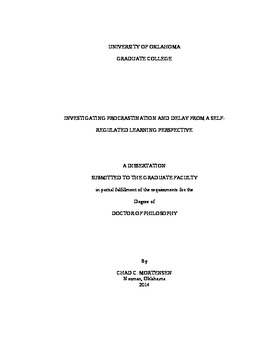| dc.description.abstract | Previous research shows that academic procrastination is maladaptive and is associated with negative learning outcomes such as decreased self-regulation, motivation, and grades. However, some recent research suggests that some students might intentionally procrastinate for positive or adaptive reasons such as maximizing learning in a minimal amount of time. Since adaptive forms of delay seem to involve positive self-regulatory and motivational characteristics, follow up research has questioned whether the purported positive procrastination behaviors actually involve procrastination.
The current study investigated this issue by examining the relationships between certain self-regulatory skills (prioritizing, time management, self-monitoring) and two types of procrastination (active and irrational). To facilitate this research, a new measure of self- regulation was developed specifically for complex tasks executed over time and in contexts involving multiple other tasks. The newly developed Self-regulation Scale for Complex Tasks (S-RCATS) was tested to provide greater construct validity evidence for the “intentional delay” aspects of the “active procrastination.”
Participants were 326 undergraduate students who completed questionnaires concerning their procrastination, active procrastination, flow, self-regulation, achievement goal orientations, self-efficacy, and perceptions of instrumentality. The findings showed that the newly developed S-RCATS was related to several antecedent and outcome variables of self-regulation, thereby confirming the self-regulatory nature of the scale. Self- regulatory skills were positively related to all but the intentional decision to procrastinate aspects of active procrastination. On the other hand, self-regulatory skills were negatively related to irrational procrastination. The results suggest that self-regulation is a major component of the concept of active procrastination, but procrastination is not. Therefore, active procrastination may be better characterized as a self-regulated delay rather than a positive type of procrastination.
Although initial analyses indicated that intentional delayers were very similar to non-intentional delayers in terms of their self-regulation, motivation, and behavior, follow-up analyses found that classifying delayers according to their self-regulatory skills revealed two distinct groups of delayers—procrastinators and self-regulated delayers—who had different motivations and behavioral outcomes. | en_US |
